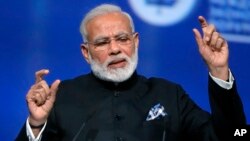The Trump administration has authorized the sale of unarmed surveillance drones to India, the manufacturer said Friday, as the two nations’ leaders prepare for their first face-to-face meeting.
India initiated its request to buy 22 Guardian MQ-9B unmanned aircraft for maritime surveillance last year. The deal is estimated to be worth about $2 billion. The offer is still subject to congressional approval.
Modi visits this week
The green light from the administration marks a further deepening in defense ties as India’s Prime Minister Narendra Modi meets with President Donald Trump at the White House on Monday.
Modi’s two-day visit to Washington, which starts Sunday, takes place amid uncertainty over the relationship because of differences on trade and other issues.
So far in his presidency, Trump has focused on outreach to China, India’s strategic rival, as he looks to Beijing to rein in North Korea. But Washington and New Delhi share concerns about China’s rise as a military power.
India reportedly wants the drones for surveillance of the Indian Ocean, waters that China’s navy increasingly traverses after establishing its first overseas base in the Horn of Africa nation of Djibouti. India’s archrival Pakistan would also likely be opposed to the drone sale.
“We are pleased that the U.S. government has cleared the way for the sale of the MQ-9B Guardian to the Indian government,” Linden Blue, CEO of the manufacturer, General Atomics Aeronautical Systems, said in a statement. Blue added that it would “significantly enhance India’s sovereign maritime domain awareness in the Indo-Pacific.”
Military sales date to 2008
Since 2008, India has signed more than $15 billion in U.S. defense contracts, including for C-130J and C-17 transport aircraft, P-8I maritime patrol aircraft, Harpoon missiles and Apache and Chinook helicopters.
Ashley Tellis, an expert on South Asia at the Carnegie Endowment for International Peace, said the U.S. decision to offer the Guardian aircraft to India is significant as the U.S. has a standing policy of declining export of such advanced drones other than to allies involved in combined operations with U.S. forces.
There could still be pushback from Congress. While there is bipartisan support for closer U.S.-India security ties, some lawmakers remain wary of the export of U.S. drone technology to non-allies.




